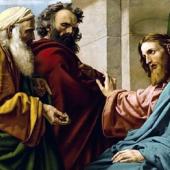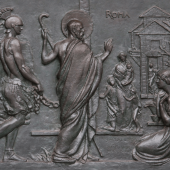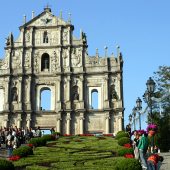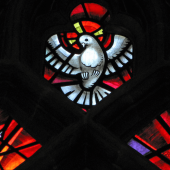Acts of the Apostles: Unique Reflections
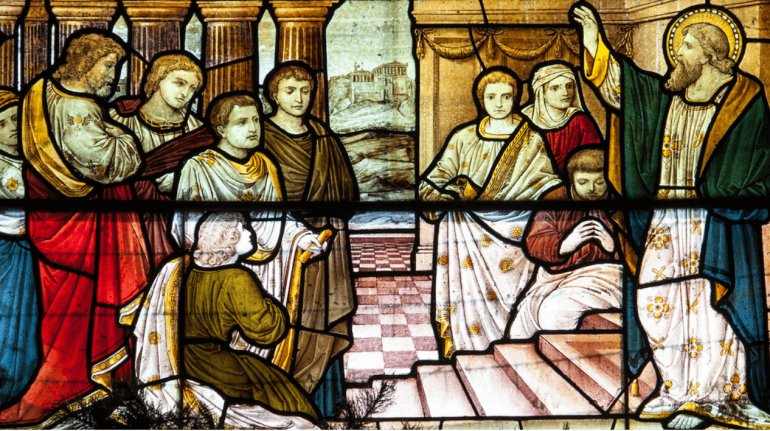
This is the first of a six-part series on Acts of the Apostles. As an introduction, it seeks to place the Book of Acts within the continuum of Biblical history and bring out its significance in establishing the Kingdom of God on earth.
Christmas season is just past us, and we are on the threshold of celebrating the Presentation of Jesus Christ precisely forty days later. It is appropriate to commence this narrative on The Acts as it is often titled, on this particular day, when the Blessed Virgin Mary met Simeon in the temple. The Lord had promised Simeon that he would not die until he saw the Messiah. Taking the divine child into his arms, he praised God and prophesied that He would be "a light of revelation to the Gentiles and the glory of your people Israel" (Luke 2:32). The narrative of our redemption through Jesus Christ takes its cue from this prophecy. It begins in the Gospels and continues to unfold itself in the beautiful story of The Acts.
Three Phases of Biblical History
If we reflect on the Bible in its entirety, we see three clear phases, each phase being closely guided by the three persons of the Holy Trinity. The Acts is the third phase and would be better understood if we see how each phase dovetails into the other to give us a panoramic view of the whole.
The First Phase: God the Father
This phase speaks of the creation and subsequent fall of mankind. God the Father -the first person of the Holy Trinity- is at the helm as He steers mankind through the course of events, from the creation of our first parent in Paradise, their subsequent banishment and exile, His choice of Abraham and his descendants as His chosen people, their hazardous journey to the Promised land and the vicissitudes of the generations that followed.
More often than not, the people and their leaders and kings were unfaithful to Yahweh, living lives of sin and debauchery, breaking the Lord's commandments and turning to idol worship. The Lord punished them for their sins, but His hand of protection was always on them, sending them prophets to warn them and bring them back to His ways.
Of greatest significance were the prophecies concerning the coming of the Messiah who would save God's people from eternal damnation. Isaiah 7:14 speaks of His birth, "Therefore the Lord himself will give you a sign: The virgin will conceive and give birth to a son and will call him Immanuel." This came 700 years before the birth of Jesus. Isaiah 53:5 speaks of the redemption of mankind through the Passion and Death of Christ, "But he was pierced for our transgressions, he was crushed for our iniquities; the punishment that brought us peace was on him, and by his wounds, we are healed."
Similar prophecies by King David, Micah, Hosea and many others are recorded in the Old Testament, paving the way for the coming of Jesus Christ - the second person of the Holy Trinity.
The Second Phase: God the Son
This phase is recorded in the four gospels of the New Testament and heralds the arrival of the Messiah as Jesus begins His public ministry. True to His name Emmanuel, meaning God with us, He was in physical proximity with the common people, painstakingly teaching them the Way, helping them to unlearn some meaningless rituals taught by the crafty teachers of the law and the Pharisees.
Jesus' fame spread far and wide as He healed the sick and delivered people from demonic possessions. Soon He began to speak of His mission to establish the Kingdom of God, "and to give his life as a ransom for many." The Gospels end with the Passion, Death and Resurrection of Christ, resulting in the redemption of mankind from the burden of sin and death and the promise of eternal life for His faithful followers.
The Third Phase: God the Holy Spirit
The mission of spreading the Word of God "to the ends of the earth" comes next in God's divine plan for mankind. The third phase commences here as the resurrected Christ promises that the third person of the Holy Trinity, 'the Spirit of Truth' will descend upon them and empower them to be His witnesses throughout the world.
The Acts give us the entire account of how Christianity spread, freeing itself from the confines of Jerusalem and Judea and bringing Gentiles and foreigners into its fold. The apostles, emboldened by the Holy Spirit, are galvanized into action, capable of communicating and convincing others of all that Jesus had taught them during the three short years He spent with them.
Through these three phases- the Old Testament, the four Gospels and The Acts God's original plan for the creation, redemption and establishment of God's Kingdom is revealed to us as it happens. The story does not end there. This mission of evangelization will continue from generation to generation till the Second Coming prophesied by the white-robed angels soon after the ascension of Christ, "This same Jesus, who has been taken from you into heaven, will come back in the same way you have seen him go into heaven" (Acts 1:11).
Who wrote the Acts of the Apostles?
Having understood the flow of events that culminated in The Acts, it is crucial to know the author's credentials for this robust discourse. The authorship of The Acts has been attributed to Saint Luke, though there is no documented proof of this. Yet, both the Gospel of Luke as well as the Acts mention Theophilus, who was probably a student or a patron of Luke. Both books are dedicated to him.
In the Acts, Luke refers to his 'former book,' which reinforces the idea that both books had a common author. The Acts was probably meant as a sequel to his Gospel to complete the story of the redemption and the subsequent establishment and spread of Christianity. Besides, he was the travelling companion of Saint Paul and had first-hand knowledge of the events as they played out. Saint Paul has referred to him in his letters to the Colossians (4:14), and these references are repeated in his letter to Timothy and Philemon.
The Acts is generally believed to be written in the early 60s and covers a time period equal to that covered in Luke's Gospel. The Acts concludes with the incident of Saint Paul's house arrest in Rome, where he continued his mission of evangelization for two years, adding evidence to the dates discussed above.
How does Jesus prepare his future leadership?
Jesus' choice of diversity in the core team
The main protagonists in The Acts are the apostles of Jesus, and it was through them, the Holy Spirit worked to spread the Word of God and bring all people to His Way. The choice of the leaders and their subsequent training began early during the public ministry of Jesus.
Jesus chose them from the ordinary people of His time: fishermen, tax collectors and others. They were vastly different in character. Peter was impulsive and sometimes cowardly; the sons of Zebedee were ambitious; Thomas was doubtful of the veracity of Christ's resurrection; Judas betrayed Jesus for thirty pieces of silver.
Excepting Judas, all of them shed their preconceived notions and became faithful followers and champions of Christ. They were neither scholars nor teachers as one would have expected, considering the office He was training them for. But Jesus did not require that. They were assured that the Holy Spirit would empower them to speak what was required according to each situation.
Jesus' method of training the apostles
The twelve apostles formed the primary group, and they went everywhere with Jesus, listening to His teachings, seeing Him delivering people from demonic possessions and healing the sick. When the first phase of training was over, He sent them to spread the message of the Kingdom of heaven among the unbelieving Jews, 'the lost sheep of Israel.'
Jesus gave the apostles all powers of healing and deliverance that He himself had demonstrated earlier. He also warned them of the challenges they would face, of arrests and persecution for His sake. They would be like sheep among wolves, and he sharpened their faculties to be "shrewd as snakes and as innocent as doves" (Mathew 10:16).
Jesus' empowers Peter as a leader "beyond earthly boundaries"
Once the training was underway, Jesus gave the final touch to the leadership training program. He decided to choose a leader who would be His representative on Earth. The mantle fell on Peter, for Jesus perceived in him a spiritual capability and openness of heart that helped him recognize Jesus as the Messiah, whose coming had been proclaimed by prophets over the centuries.
Peter was the "rock" the foundation on which Jesus planned to build His church. The power entrusted to him went far beyond earthly boundaries. The gates of Hell would fail against him. He would possess the keys of heaven. Whatever he ordained on Earth would have the assent of the Most High in heaven.
Thus, Jesus Himself took up the responsibility to teach, train and empower the next level of leadership. He set up the fundamental organizational structure with the head, who represented Christ the King on Earth, with divine power over earth and against evil forces. He appointed twelve apostles to lead the ministry after His ascension. With this rudimentary group, the Holy Spirit began His work in The Acts. As the numbers grew, the structure was expanded, and each portfolio was clearly understood.
Today, the Catholic Church follows more or less the same hierarchical patterns, with the Pope as Peter's successor and the bishops, priests, and deacons with their respective responsibilities.
The preamble to the Acts
The Acts follows closely on the heels of the final chapters of the gospels, especially those of Luke and John. Two incidents reported in the final chapter of John's Gospel form a fitting preamble to the events recorded in the Acts. The first is the appearance of the Resurrected Lord to the apostles who had spent a long and frustrating night trying to catch fish with little success. Jesus tells them to throw their net on the right side, and their nets are filled with fish. They would perhaps remember this miracle later, as they became 'fishers of men' anointed and empowered by the Holy Spirit.
The second incident is the covenant the Lord seals with Peter, reiterating His resolve to appoint Peter to head the mission. The exchange between the Master and Peter is unforgettable in its simplicity and its power, as Jesus says, "Simon, son of John, do you love me?" Peter answered, "Yes, Lord, you know that I love you." Jesus officially hands over the task of building God's Kingdom to Peter "Take care of my sheep." The exchange between them is repeated thrice, giving the occasion all the solemnity it deserved.
Little did Peter realize the enormity of the responsibility he had just undertaken. He was to emerge as the leader of the first Christians, unstoppable and fearless in the face of the greatest challenges. The Acts take up the course of events from this point onwards.
Check out the entire series on the Acts of the Apostles
- Part 1 - Acts of the Apostles: Unique Reflections
- Part 2 – How did Christianity Spread after Ascension?
- Part 3 – The Work of the Holy Spirit beyond Jerusalem
- Part 4 – The Spread of Christianity beyond Judea and Samaria
- Part 5 - Paul’s mission in Europe and Asia
- Part 6 - Moving To the Ends of the Earth
Radio Veritas Asia (RVA), a media platform of the Catholic Church, aims to share Christ. RVA started in 1969 as a continental Catholic radio station to serve Asian countries in their respective local language, thus earning the tag “the Voice of Asian Christianity.” Responding to the emerging context, RVA embraced media platforms to connect with the global Asian audience via its 21 language websites and various social media platforms.










